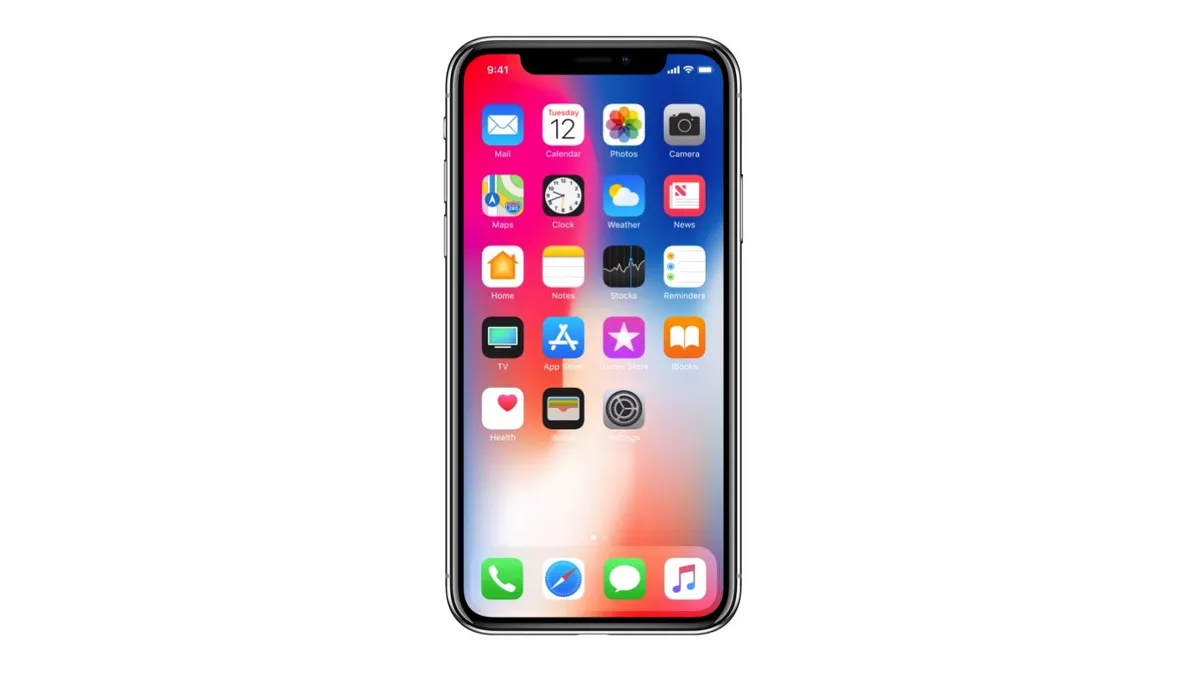Dive Brief:
-
Apple made several new device and feature announcements Tuesday, including the unveiling of the upcoming iPhone X (10), which will be the first iPhone to include Face ID technology that can be used to authenticate payments, according to Apple and published reports.
-
Angela Ahrendts, Apple's senior vice president of retail and online stores, also gave a brief update at the event on Apple’s brick-and-mortar retail strategy, saying among other things that a new Apple retail location will open in Chicago on Oct. 20, that Apple’s iconic glass box retail outlet in New York City will be remodeled, and that the company has other new locations planned for Washington, D.C. and elsewhere.
-
The iPhone X will cost $999, and will be generally available on Nov. 3, available for pre-order Oct. 27. Apple CEO Tim Cook and other executives also announced the new iPhone 8 and iPhone 8 Plus, and a new Apple Watch with cellular connectivity, all of which will be available on Sept. 22. Also, the iOS 11 software update will be available on Sept. 19.
Dive Insight:
There are a number of retail implications in the announcements Apple made Tuesday, though some of the broader effects will not be known for some time. This is especially true of the Face ID feature in the iPhone X and the enhanced capabilities supporting augmented reality applications available across all the new devices.
One thing we can tell you right now is that the Face ID facial recognition feature actually appeared to fail when an Apple executive first attempted to demonstrate it during Tuesday's event, though it did appear to work correctly when he tried it a few minutes later.
Face ID is a function of the iPhone X's front-facing camera, which uses image sensors and neural network technology to recognize a user's face. Registering your face with the device means it can be used to unlock the phone as well as authenticate payments to the Apple app store through Apple Pay. The latter was widely rumored to be the case prior to Tuesday's confirmation, though Apple did not go as far as explaining how Face ID potentially could support authentication of payments on websites and in the apps of retailers that accept Apple Pay, or how it could evolve to replace Apple's existing Touch ID technology. (The iPhone X does not have a biometric sensor.)
However some Apple observers are clearly excited about the prospects. Michael Levine, vice president of marketing at digital experience enabler Photon, told Retail Dive via e-mail that as biometrics technology advances, touch-based biometrics are becoming outdated. "Apple’s new Face ID removes the last trail of friction — touch — and brings even greater ease of use to authentication," he said. "While the immediate opportunity is with Apple Pay, I would expect adoption [integration] across any authentication point for any conceivable service — of course, running on Apple's ecosystem."
Apple also touted Face ID's security protections, claiming that there is a one in 1 million chance that its Face ID system can be spoofed.
In addition to Face ID, another new iPhone feature with retail implications is enhanced support in the new iPhones for augmented reality. Apple CEO Tim Cook on Tuesday described the iPhone 8 as "the first iPhone created for augmented reality applications," with its sensors and other technology in both of its cameras specially "calibrated for AR."
In both the case of Face ID and AR support, Cook and other executives did not talk directly about the effects these features could have on retail or other industries. However, it's pretty clear that they lay the foundation for new payment authentication practices, new retail AR applications and more.
Aside from all of the new device news, the appearance of Ahrendts was a bit of a surprise. In addition to talking up openings of more new Apple retail locations, she continued with a company line that began last year when Apple said it was no longer calling physical retail locations "stores." Ahrendts said Tuesday that the stores (oops) were now called "town squares," alluding to a statement Ahrendts made almost a year ago when she first announced that Apple would be revamping retail locations to give them more of a "town square" or community-oriented feeling.
Her statements seemed more like a reiteration of that strategy, though she did mention a couple new details, like the notion that in-store "Genius Bars" offering assistance to customers would become "Genius Groves," and that store aisles would be referred to as "avenues." Honestly, it seemed like people watching the webcast were paying a lot more attention to the fancy pink coat Ahrendts was wearing.















